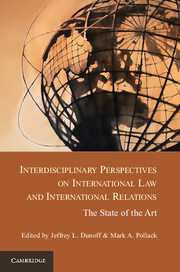 Interdisciplinary Perspectives on International Law and International Relations
Interdisciplinary Perspectives on International Law and International Relations Book contents
- Frontmatter
- Contents
- Contributors
- Acknowledgments
- Part I Introduction: Setting the Stage
- Part II Theorizing International Law
- 3 Institutionalism and International Law
- 4 Liberal Theories of International Law
- 5 Constructivism and International Law
- 6 Wanted – Dead or Alive
- Part III Making International Law
- Part IV The Interpretation and Application of International Law
- Part V Enforcement, Compliance, and Effectiveness
- Conclusions
- Index
- References
6 - Wanted – Dead or Alive
Realism in International Law
Published online by Cambridge University Press: 05 January 2013
- Frontmatter
- Contents
- Contributors
- Acknowledgments
- Part I Introduction: Setting the Stage
- Part II Theorizing International Law
- 3 Institutionalism and International Law
- 4 Liberal Theories of International Law
- 5 Constructivism and International Law
- 6 Wanted – Dead or Alive
- Part III Making International Law
- Part IV The Interpretation and Application of International Law
- Part V Enforcement, Compliance, and Effectiveness
- Conclusions
- Index
- References
Summary
“Realism” is the theory international lawyers love to hate. Dozens of commentators have attacked realism or written its epitaph. Some commentators have even asked: is anybody still a realist? (Legro and Moravcsik 1999).
Many international law (IL) scholars challenge “realism” because most think it means that international law is epiphenomenal and so devoid of meaning – which could make their jobs irrelevant, wasteful, and quixotic. But they also seem to love realism – or a version of it – because the misunderstood and mischaracterized structural realist straw-man claim that “international law does not matter” serves for them as the perfect foil for arguments that international law is important. It is the null hypothesis that enables international lawyers to show that their argument and life's work does have meaning. So, in a sense, even those who hate “realism” actually love it – in the same way that prohibitionists hated alcohol, Joe McCarthy hated Communism, and family values conservatives hate pornography. What would they do without it?
- Type
- Chapter
- Information
- Interdisciplinary Perspectives on International Law and International RelationsThe State of the Art, pp. 146 - 172Publisher: Cambridge University PressPrint publication year: 2012


